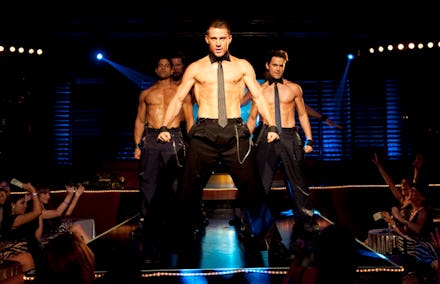What Channing Tatum Understands About Self-Parody

The first trailer for 22 Jumpstreet hit the web last week. This is the second installment in the spoof reboot of the 80s TV crime drama, 21 Jumpstreet, and an abrupt departure for its star, Channing Tatum.
Tatum, who established himself as leading man in serious, albeit campy, genre films like G.I. Joe and She's the Man, kicked off a re-branding campaign after the release of the first installment of the comedy franchise in 2012. Since then, Tatum has subverted his Hollywood hero persona through a series of ironic, self-effacing, and rib-tickling appearances. And this evolution isn't just part of an identity crisis for the young stud muffin. Tatum's goofy career choices reflect a curious development in the entertainment world: the rise of self-parody.
Tatum began his career as a humorless leading man and glorified meat-stick, dancing, fighting, or sucking face as beefcake characters with names like Rowdy or Duke. But in the last two years the Hollywood heartthrob has made aggressive use of self-parody to mock the cliché macho image that made him famous. First came Tatum's starring role in Steven Soderbergh's 2012 burlesque comedy Magic Mike, which pokes fun at Tatum's days as a professional stripper before his acting career.
To promote the pseudo-autobiographical, pseudo-pornographic picture, Tatum again turned to self-parody, releasing a satirical rap video on Jimmy Kimmel Live entitled "(I Wanna) Channing All Over Your Tatum" that mocks his own sex symbol status. The film easily could have proved a branding disaster for the action star, but was ultimately a financial and critical success.
But Tatum's most mortifying appearance to date is his cameo in the Seth Rogen apocalypse comedy This is the End. Through the course of the film, Tatum goes from sex symbol to sex slave, donning ass-less leather gimp regalia as Danny McBride's erotic puppet, "Channing Tate-yum." The message is clear: Tate-yum is cynical about his own celebrity.
Twenty years ago, this flavor of acerbic self-deprecation was expected of Woody Allen, not G.I. Joe. That's not to say that the celebrity self-parody is a new phenomenon, but rather that what was largely exclusive to eccentric comedians is now conventional for anyone with an IMDb page (see McGuire, Franco, Van Damme, and Bolton). Youtube, BuzzFeed, and FunnyOrDie offer a bevy for the buffer. Breaking Bad, perhaps the most iconic TV drama of the last decade, has its own spoof alternate ending. Even no-drama Obama is self-satirizing.
But this sudden spike in self-parodies isn't a random fad. This comic format is popular because it speaks to the millennial generation's abiding love of irony.
Irony is the "ethos of our time," pervading nearly every aspect of millennial daily life — our music, our political movements, even our facial hair. We use irony to challenge hypocrisy, cultural conventions, and the status quo, to separate truth from bullshit. Hollywood may be in the ultimate bullshit manufacturing business, but it's figured out how to tap into the millennial zeitgeist through this trend towards self-parody. After all, what is more ironic than an ego-maniacal actor mocking the persona that made him or her famous?
Tatum may simply be trying to laugh at his own celebrity or to deflect criticism away from his crap-tacular 2010 feature Dear John. But, his ironic appearances remind us that before he was People Magazine's Sexiest Man Alive, Tatum was just a college-dropout stripper from the Mississippi bayou with a very silly name. By proving that he is self-aware, Tatum can convince his fans that he is sincere. And sincerity is what the millennial obsession with irony is all about.
No one in Hollywood is genuine, but we still crave public figures we can relate to and who seem authentic. Ironically, this self-parody communicates the impossibility of authenticity in the first place; it demonstrates that celebrities can never live up to their public image, making Hollywood's confession of inauthenticity is its most honest message yet.
The tin gods of Tinseltown should take note of Tatum's runaway success — his spree of sadist self-parodies hasn't precluded the young actor from taking on serious dramatic roles. And in June 2014, the hunk-cum-humorist will appear in his most significant picture yet — the Wachowskis' much anticipated science fiction epic Jupiter Ascending. It's a lesson to the real Magic Mike's of the world: There's always money in the banana hammock.